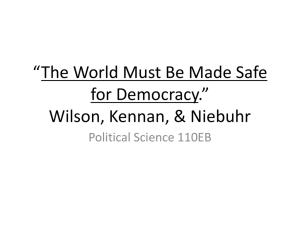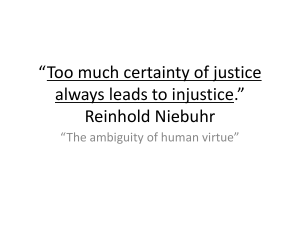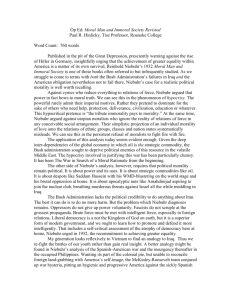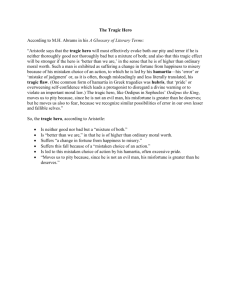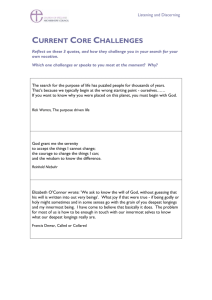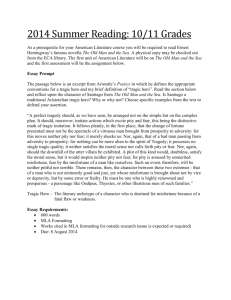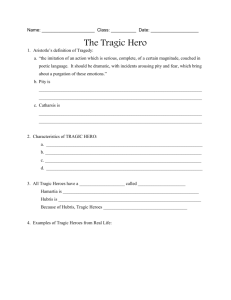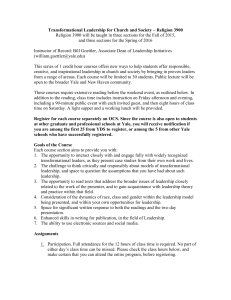07 Niebuhr
advertisement
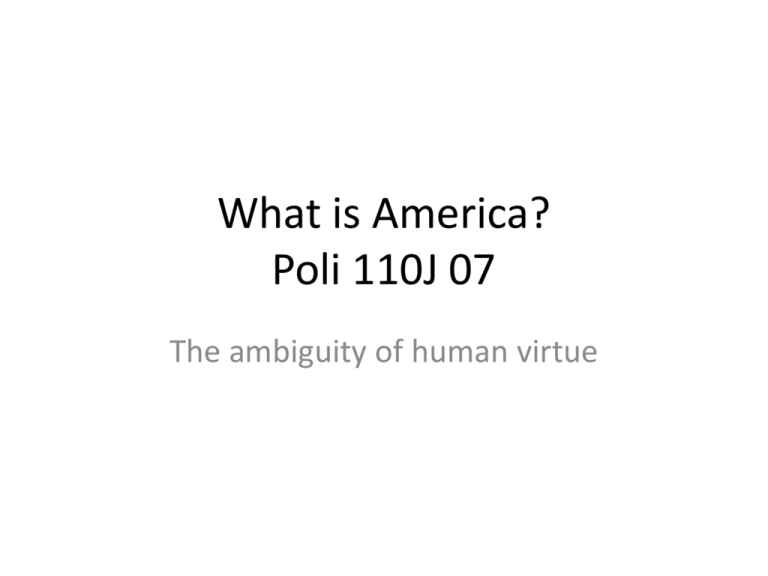
What is America? Poli 110J 07 The ambiguity of human virtue • Politics & the critical dimension – The capacity to say “no” – The ability to imagine a different world Reinhold Niebuhr • • • • • 1892-1971 Labor activist Pacifist in youth Anti-communist Theologian & public intellectual • “Christian realism” & just war theory • Critic of Vietnam war Core Themes • • • • • • Original sin Humility The inevitability of war Morality + politics = responsibility American history characterized by irony “Christian realism” – Vs. realism – Vs. idealism Key Terms • • • • • • Pathetic Tragic Ironic Sin Bourgeois liberalism Communism The pathetic • Pathos • “Pathos is that element in an historic situation which elicits pity, but neither deserves admiration which elicits pity, but neither deserves admiration nor warrants contrition.” – Pity the appropriate response of the spectator – No positive or negative moral attribution The pathetic • “Pathos arises from fortuitous cross-purposes and confusions in life for which no reason can be given, or guilt ascribed. Suffering caused by purely natural evil is the clearest instance of the purely pathetic.” – No reason – Cancer, earthquakes, etc. The tragic • Tragōidia • “The tragic element in a human situation is constituted of a conscious choices of evil for the sake of good. If men or nations do evil in a good cause; if they cover themselves with guilt in order to fulfill some high responsibility; or if they sacrifice some high value for the sake of a higher or equal one they make a tragic choice.” The tragic • Tragedy is a choice between conflicting goods – Lesser evils, only bad choices • An admission, not a denial, of guilt – A realization that the lesser evil remains evil • No such thing as a “tragic flaw” The tragic • “Tragedy elicits admiration as well as pity because it combines nobility with guilt.” – The appropriate response of the spectator to tragedy is pity for the agent in the tragic situation, admiration for its moral responsibility, and condemnation for its guilt. – For Niebuhr, the Cold War is tragic The ironic • Eirōneía (feigned ignorance) • “Irony consists of apparently fortuitous incongruities in life which are discovered, upon closer examination, to not be merely fortuitous.” – An element of the comic, but more than comic. Laughter, but also realization & insight. The ironic • Different from pathetic situations in that the actor involved bears responsibility for the situation. • Different from tragedy in that the responsibility is due to an unconscious weakness rather than a conscious decision. The ironic • Strength becoming weakness due to vanity of strength = ironic • Realization of ironic complicity must lead to “abatement of pretension, which means contrition; or it leads to a desperate accentuation of the vanities to the point where irony turns into pure evil.” The ironic • Niebuhr understands Christianity as inherently ironic. – Ex) The Crucifixion as the final victory of Christ Sin • More than just doing bad things. • Doctrine of original sin, roots in Augustine • Humans inherently, not just tendentially, corrupt. • Resultantly, all human efforts must be imperfect • Humility thus a necessity Bourgeois liberalism • • • • Capitalist Competitive elections Rights-based legal system Tendency to embrace the perfectibility of humanity, rejecting universality of sin • Tendency to pretend innocence Communism • For Niebuhr, this means Soviet communism • Claim to possession of absolute knowledge, and thus mastery, of historical processes. • Led by the vanguard, a group that best understands the historical dialectic, and thus by definition acts for the benefit of the proletariat • Historical processes make final victory of communism inevitable. The limits of freedom • Extravagant emphasis on individual freedom – For Niebuhr: – The freedom to completely make oneself is a falsehood – Humans occur within societies, and are partly made by them The limits of freedom • In our culture, emphasis on overt, rather than covert, forms of power. • “Since property is a form of power, it cannot be unambiguously a source of social peace and justice. For every form of power, when inordinate or irresponsible, can be a tool of oppression or injustice.” – Thus, too much emphasis on voluntarism The limits of control • “Despite the constant emphasis upon the ‘dignity of man’ in our own liberal culture, its predominant naturalistic bias frequently results in views of human nature in which the dignity of man is not very clear.” (6) – Science as a worldview – The human as creature The limits of control • The acknowledgement of the reality of the free self “introduces an unpredictable and incalculable element into the causal sequence. It is therefore embarrassing to an scientific scheme.” – The measurable as the real – The human as object, not subject. Humans not essentially different from molecules. – Too much emphasis on control • For Niebuhr, each of these things is bad – Denies limits of human condition, which for his both as creature and creator – Both fantasies of total control, ignoring the limitations of human power and knowledge • Fortunately for Americans, their creed is incoherent, and these two positions counteract each other, leading to pragmatic adjustment – Equilibrating power • The menace of communism is in its coherency, which enhances the power of its dogma • Niebuhr sees in Communism a kind of atheistic religion, with Russia as its holy land. • For Niebuhr – Communism describes property (ownership) as the sole source of power – Political power (government) is a front for this power – Thus, only the property-less class (the proletariat) is disinterested, and can act in the universal interest • Since property is for Communists the only form of power, the property-less have no particular interests to defend • The vanguard are the first group to achieve revolutionary class consciousness, comprehending the laws of history • Thus, they act in the interest of all humanity. • Moreover, they act freely: finally understanding the laws of history, they can act in understanding of true reality – N. sees here a contradiction: if everything is historically determined, how can action be free? • Thus, the Soviet government must adopt an attitude of hostility toward all other forms of government, denying their legitimacy and viewing them as destined for overthrow • The basic problem of the Soviets, for Niebuhr, is pride – Believe in the absolute truth of their dogma – Embrace vanguard (Soviet gov’t) as infallible • Moral reasoning by definition is for Niebuhr inherently problematic, reflecting pride. • “Too much certainty of justice always leads to injustice.” • America shares these messianic impulses, but they have been checked by historical contingency – Ironically, America is less free at its moment of greatest power than it was in its fragile infancy – But pretensions to innocence, to newness, remain • Realists, Idealists Against “Realism” • Cold War realists argued that any means was justified in combating Communist nations – Vanity, a pretense that America is so good as to legitimate any means – “Loyalty to the community is... Morally tolerable only if it includes values wider than those of teh community.” – For Niebuhr, communities cannot be moral, cannot transcend themselves. Against “Idealism” • For Niebuhr, the idea that the nation can withdraw from the world, or that all disagreements can be talked out. – The first prizes moral purity over moral responsibility – The second is naive in its refusal to acknowledge the Communist threat • For Niebuhr, moral behavior requires responsible engagement w/the world, which will sometimes mean compromised morality – To be good, one cannot be pure. Niebuhr’s Religious Validation of Politics • P. 63 • Nothing that is worth doing can be achieved in our lifetime; therefore we must be saved by hope. • Nothing which is true or beautiful or good makes complete sense in any immediate context of history; therefore we must be saved by faith. • Nothing we do, however virtuous, can be accomplished alone; therefore we are saved by love. • No virtuous act is quite as virtuous from the standpoint of our friend or foe as it is from our standpoint. Therefore, we must be saved by the final form of love which is forgiveness. – A critical dimension not only on politics, but on the self. – Morality not relative, but our understanding of it is flawed. • Strangely enough, none of the insights derived from this faith are finally contradictory to our own purpose and duty of preserving our civilization. They are, in fact, prerequisites for saving it. • If the US is destroyed, the “primary cause would be that the strength of a giant nation was directed by eyes too blind to see all the hazards of the struggle; and the blindness would be induced not by some accident of nature or history but by hatred & vainglory.
